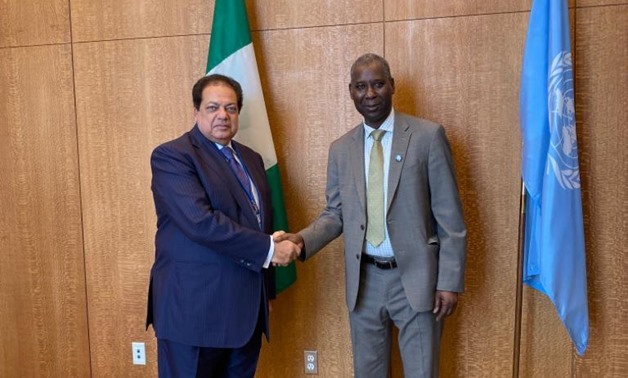
United Nations General Assembly Tijjani Muhammad in his meeting with Eygptian businessman and Honorary President of the Euro-Mediterranean Parliament Assembly (EMPA) Mohamed Abou el-Enein- press photo
CAIRO - 29 September 2019: No country has the right to deprive any other state from water or to break agreements with it even in case of war between the two countries, said United Nations General Assembly Tijjani Muhammad in his meeting with Egyptian businessman and Honorary President of the Euro-Mediterranean Parliament Assembly (EMPA) Mohamed Abou el-Enein on Saturday.
“Water is a human right [...] this problem must be solved through negotiation,” Tijjani said in the meeting, which was attended by a number of EMPA members. He affirmed that finding a solution to the current dispute between Egypt, Sudan, and Ethiopia on the Grand Ethiopian Renaissance Dam (GERD) will be on his agenda’s priority, saying that he will be on contact with Ethiopia, sudan and Egypt to reach a diplomatic solution.
With leaders of the international community President Abdel Fatah al-Sisi has tackled the crisis of disagreement between Egypt and Ethiopia and its threat to the Egyptians, said Abou el-Enein,
“Egypt is not against Ethiopia over building the Renaissance dam and the president pays more attention to strengthen the Egyptian relations with the African countries, “ Abou el-Einein said.
“Entering the phase of filling the dam, unilaterally by Ethiopia, and without reaching agreements or regulatory framework with the participation of the three countries, Egypt, Sudan and Ethiopia, is a dangerous indicator,” he added.
Egypt and Ethiopia are at loggerheads over the controversial and under-construction Grand Ethiopian Renaissance Dam (GERD) as Cairo voiced its concern over its share after Ethiopia started building the dam on the Blue Nile in May 2011. A series of tripartite talks between the two countries along with Sudan has begun in 2014. One year later, the three countries reached an agreement, per which the downstream countries [Egypt and Sudan] should not be affected by the construction of the dam. However, the two countries recently blamed each other for hindering a final agreement concerning the technical problem.
Sameh Shoukry told Al Monitor in New York that the Ethiopian development should come at the expense of the lives of Egyptians.
He added that the disagreement is a “scientific issue”, saying “science should not be manipulated politically.” The problematic point between Egypt and Ethiopia is related to the period of filling the dam’s reservoir with water; Egypt has recently submitted the Ethiopian and Sudanese sides a proposal to fill the dam’s reservoir over seven years. The dam’s capacity is 73 billion cubic meters of water and this means that Egypt will lose 10 billion cubic meters annually of its 55.5 water share over the proposed period. However, Ethiopia rejected the offer.

Comments
Leave a Comment